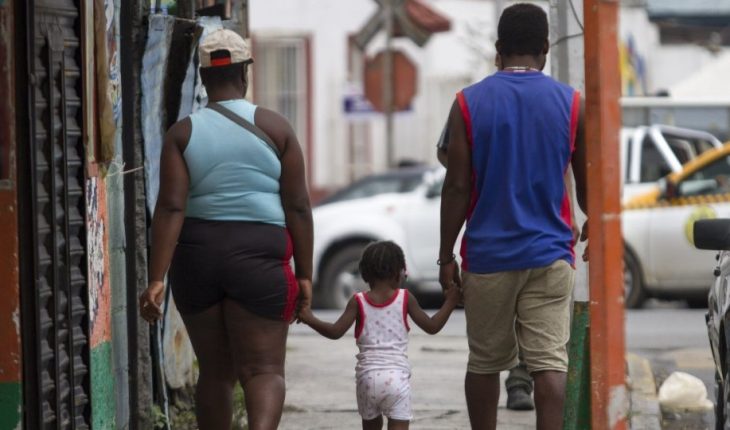Pierre Mailleky, a 39-year-old Haitian, his wife and 5-year-old son were deported on February 3, 2020. They had been in Mexico since July 2019, when they arrived from Chile. After several months locked up in the Siglo XXI migrant holding center, they applied for asylum before the Mexican Commission for Refugee Aid (Comar), where they began their procedure to receive protection. Without having completed the process, agents of the National Institute of Migration (INM) arrested them and sent them back to Haiti. The National Human Rights Commission issued a recommendation calling for recognition as a victim and denouncing the expulsion.
“I want to go back so I can live peacefully with my family,” Mailleky says in a phone interview. After his expulsion to Haiti, he feared for his life and took refuge in the Dominican Republic, where he hopes that the Mexican authorities will allow him to return to resume his process.
Read: Neither Fox, nor Calderón, nor Peña: AMLO government breaks record of migrant detention
Animal Político wanted to know the opinion of the INM and know if it will accept the recommendation, but at the close of the edition it had not received a response.
“The INM must accept the recommendation, it must investigate and seek reparation for the family, which can be recognized as a victim. With the reparation of the damage, it means that she can return to Mexico,” says Brenda Ochoa, director of the Fray Matías de Córdova Human Rights Center in Tapachula, an organization that has accompanied the family’s complaint since it was expelled.
From Chile to Tapachula
The history of the Maillekys is similar to that of thousands of compatriots who in recent years exchanged Chile and Brazil for Mexico. He explains that he left his country in 2014 after suffering threats and even an assassination attempt by a criminal group. They arrived in Chile, which had opened visas after the 2010 earthquake. However, his situation was always precarious. So in 2019 they embarked on the dangerous road north, crossing the Darien jungle, between Colombia and Panama. On July 25, 2019, the family arrived in Mexico via the Suchiate River in Chiapas and was immediately detained. They remained locked up in the Siglo XXI migrant station in Tapachula, Chiapas, until August 16, when they applied for asylum before Comar officials, which allowed them to leave the detention center. “In my country there is no security, there is no future,” he explains. At the time, hundreds of people from the Democratic Republic of the Congo, Cameroon and Angola were camping in front of Siglo XXI, demanding that the Mexican authorities allow them to continue on their way north. This is not the case of the Haitian family, which according to the man, never wanted to cross into the United States.
Find out: Mexico begins ‘voluntary repatriation’ flights of Haitian migrants
“I was going to sign every week, they gave me my appointment for the interview, they changed my date,” he explains. Every day he worked in the Plaza de Tapachula selling cell phone chips and exchanging money to newly arrived migrants. In addition, he rented his house to those who needed a place to sleep after the trip. On January 18, however, INM agents arrested the family and, even though they had documentation proving they were asylum seekers, returned them to Haiti on February 3. “I’m Haitian, but every time they tell me about the country I get scared, because I know what it is,” he says.
He relates that as soon as he landed he had to suffer several shootings carried out by gangs that control the capital, Port-au-Prince. Frightened by the possibility of an attack, he decided to march to the Dominican Republic. His wife, on the other hand, stayed in Haiti.
In its recommendation, the CNDH recognizes that the INM violates Mailleky’s rights by forcing him to sign documents in Spanish without a translator and expelling him without taking into account that he was in a refugee process. In addition, he denounces that his 5-year-old son was deported, for being contrary to the best interests of the child, and that the entire operation violated the principle of non-refoulement. Therefore, the institution led by Rosario Piedra Ibarra asks that the family be recognized as a victim (which should allow him to return to Mexico to continue his process) and that compensation mechanisms be established. So far, the INM has not announced whether it accepts the recommendation.
An opportunity to return
“First they would have to accept the recommendation, follow the investigations and ask the victim what they are requesting,” says Brenda Ochoa, of the Fray Matías Human Rights Center. In his opinion, the way is opened for the family to request their return to Mexico in order to be recognized as a refugiados.
“This shows that the situation has not changed. A few weeks ago, Haitian families who had also applied for asylum in Mexico were deported. It shows that there is no respect for due process,” says the activist, in relation to the deportation flights from Tapachula that departed in September, after the arrival of thousands of Haitians in Ciudad Acuña, Coahuila, on the border with the United States. .
According to the latest update of Comar, in 2021 a total of 47,494 Haitian people requested asylum in Mexico, to which we must add more than 6,000 from Chile and almost 4,000 from Brazil who are children of Haitians. It’s more than half of the nearly 120,000 asylum applications registered this year. Many of them turn to Comar to regularize their situation and set off north. Mailleky, however, is not interested in that route. “My choice is to work to move forward. If I am in a country that serves me, that offers me work, I have no reason to look for another country. There are many people who have the idea of going to the United States, I say it is not worth it,” he says. Now Mexico has the option of giving him that second chance that immigration officials irregularly snatched from him.
What we do at Animal Político requires professional journalists, teamwork, dialogue with readers and something very important: independence. You can help us keep going. Be part of the team.
Subscribe to Animal Político, receive benefits and support free journalism.#YoSoyAnimal





